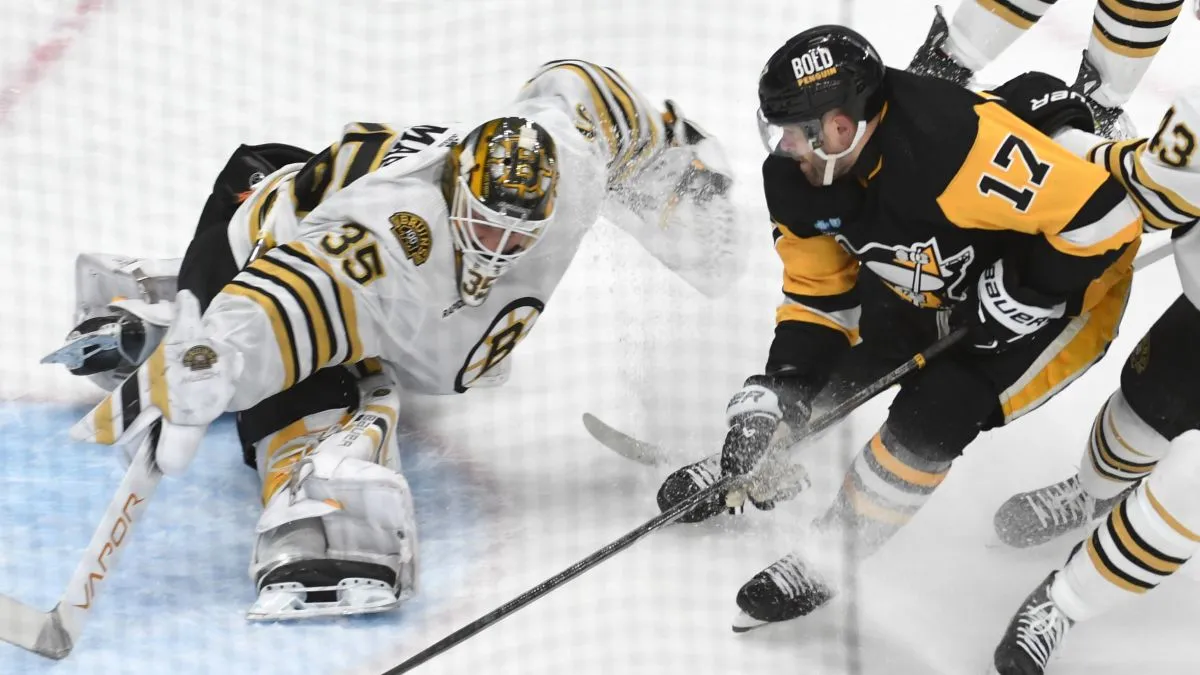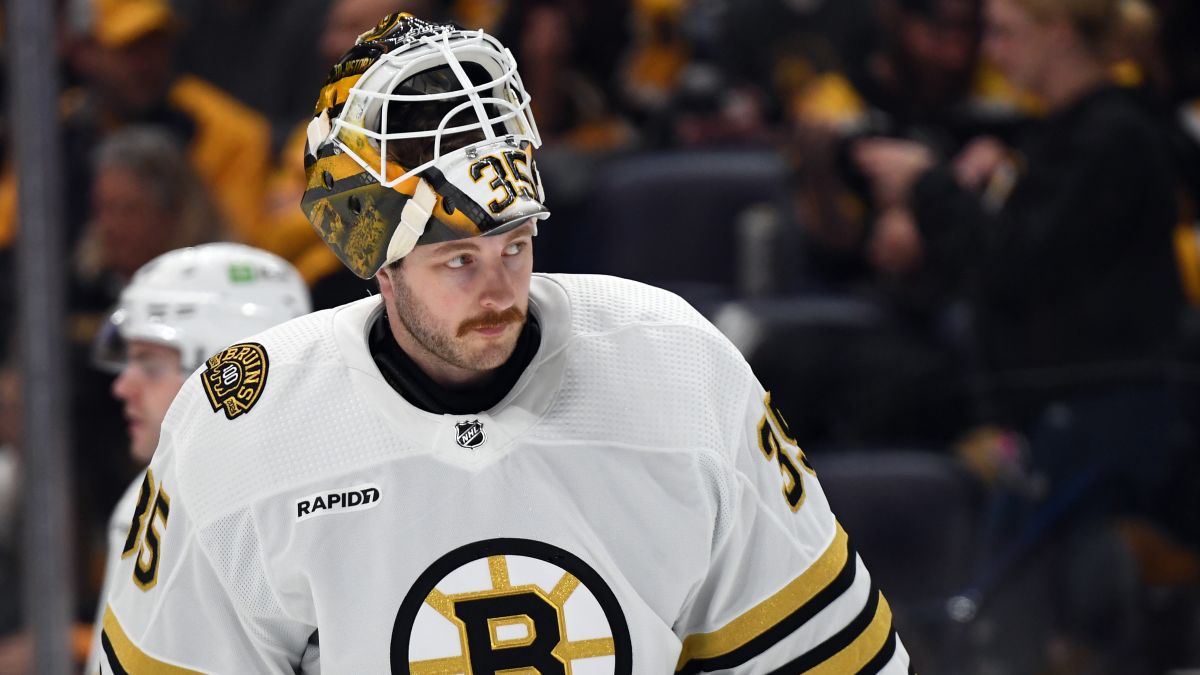The clock is ticking for Tuukka Rask and the Boston Bruins.
The 33-year-old Finnish netminder will be headed into the final year of his contract with the Bruins following this summer’s Return to Play playoffs, and he’ll be coming off a season that should make him a Vezina Trophy finalist for the second time in his career.
Rask, of course, won the award in the 2013-14 NHL season and is in a bit of a two-man race with Winnipeg’s Connor Hellebuyck for the honors as the NHL’s top goalie this time around.
Get the latest news and analysis on all of your teams from NBC Sports Boston by downloading the My Teams App
But it’s all proof that he’s essentially lived up to a contract that paid him $7 million a season as one of the highest paid goaltenders in the NHL. Rask is also the second-highest paid player on the Black and Gold behind center David Krejci, but he’s dropped to fifth in salary among NHL goalies with Carey Price, Sergei Bobrovsky, Henrik Lundqvist and Marc-Andre Fleury all equal or greater in annual salary.
All of that makes it all the more fascinating what’s going to happen following this summer when Rask will enter the last year of his deal as a 34-year-old goalie with a 36-year-old backup in Jaroslav Halak. Rask and Halak won the Jennings Trophy as the NHL’s best goaltending duo this season and could very well be in line for those honors again next year.
Next year may be the last season that the Bruins can afford that partnership for a number of different reasons, but that doesn’t mean that Rask won’t continue as the No. 1 guy in Boston.
Meanwhile, the regular season accolades go on and on for Rask. He’s the all-time winningest goalie in Bruins history with 291 wins, and has the most games played (536), the most saves (13,711) and the best save percentage (.922) in the B’s nearly 100-year franchise history. Rask ranks seventh all-time in NHL history with a .9268 save percentage in the playoffs and is the active leader among all NHL goalies with a .9218 career save percentage over his 13-year career.
Boston Bruins
He ranks third all-time in career save percentage behind Dominik Hasek and Johnny Bower, both Hall of Famers. All that and he showed this season that he’s still got it as one of the NHL leaders in goals against average (2.12) and save percentage (.929) while largely splitting time with Halak. The reduced workload has been a big deal to Rask in the last couple of seasons and it allowed him to carry the Bruins with a .934 save percentage during last spring’s run to the Stanley Cup Final.
Still, Rask has yet to get the B’s over the top in two tries at the Stanley Cup Final in 2013 and 2019 and the contract negotiations are going to be fascinating given that the NHL is looking at a largely flat salary cap for the next three seasons.
According to Hockey Night in Canada’s Elliotte Freidman, the cap is going to go up a million to $82.5 million in 2022-23, but that’s essentially a flat cap for three years considering that the salary cap ceiling had been going up $3-6 million pretty much every season like clockwork.
The good news for the Bruins: They are going to presumably have some salary cap space to work with following next season as they are currently committed to just $35.7 million in salaries for the 2021-22 season, and aren’t going to be on the hook for much more than $52 million when they’ve finally dealt with open contracts for Torey Krug, Jake DeBrusk, Anders Bjork, Zdeno Chara and Matt Grzelcyk following this summer’s run of playoff hockey.
A big factor is the $7.25 million cap hit for Krejci that will be coming off the books at the same time as Rask following the 2020-21 NHL season. The expiration of the Krejci contract is going to open up considerable cap space for a strapped front office, and taking both Krejci and Rask deals off the books at the same time lops off a whopping 17 percent of their cap. It will be fascinating to see how the Bruins utilize that space with the expectation a 36-year-old Krejci will either be done playing by then, or will be playing at a greatly reduced rate moving forward.
The real question will be exactly what kind of salary an aging Rask will command at 35 years old?
He’s flirted with the notion of retirement several times over the last couple of years and it seems clear he won’t be the type to keep hanging on when it’s clear he’s at the end of his career.
But he also reiterated his desire to keep playing when he spoke with reporters about it a couple of months ago on a Zoom call.
“I haven’t thought about retirement at all,” Rask said. “I know that this [offseason], I can start talking to the Bruins about a possible extension. When that day comes, we’ll see what happens. But definitely I haven’t put any thought into retirement, nothing like that. We’ll see how this season plays out, and then we’ll see if there’s extension talks.”
He also needs a particular situation to be successful and that means the B’s employing a backup who's good enough to help keep Rask to a modest 50-55 game workload.
The need for a quality backup in Halak has meant that the B’s have shelled out well north of $9 million per year for goaltenders in their three seasons (counting next year) together. That’s a big chunk of salary cap space devoted to the guys who stop the pucks.
Given that Rask isn’t a workhorse type goalie at this point in his career, perhaps that means the Bruins could get him back for a slightly reduced rate in the twilight of his career. At a similar stage in his career, Pekka Rinne signed a two-year, $10 million contract extension with the Nashville Predators in 2018 that should pave the way for exactly what Rask could be looking at following next season.
The $5 million cap hit would take $2 million off Rask’s current cap hit and hand the Bruins extra room to improve their roster while staring down a pretty bleak financial picture over the next three seasons, if not longer than that.
A two-year deal in the $5 million AAV range would still put Rask in the middle of the pack for NHL goaltender salaries, but it would also be the same kind of reasonable deal other core Bruins players like Patrice Bergeron, Brad Marchand, Zdeno Chara and David Pastrnak have taken to keep the band together over the years. All in all, not a bad solution to the Tuukka contract dilemma.
As dire as things seem fiscally for the NHL and especially this coming offseason for the Bruins with limited funds to sign a handful of key players, it actually doesn’t seem like a new contract for Rask will be all that tricky as long as all parties involved want to keep Tuukka Time going for a while longer.


